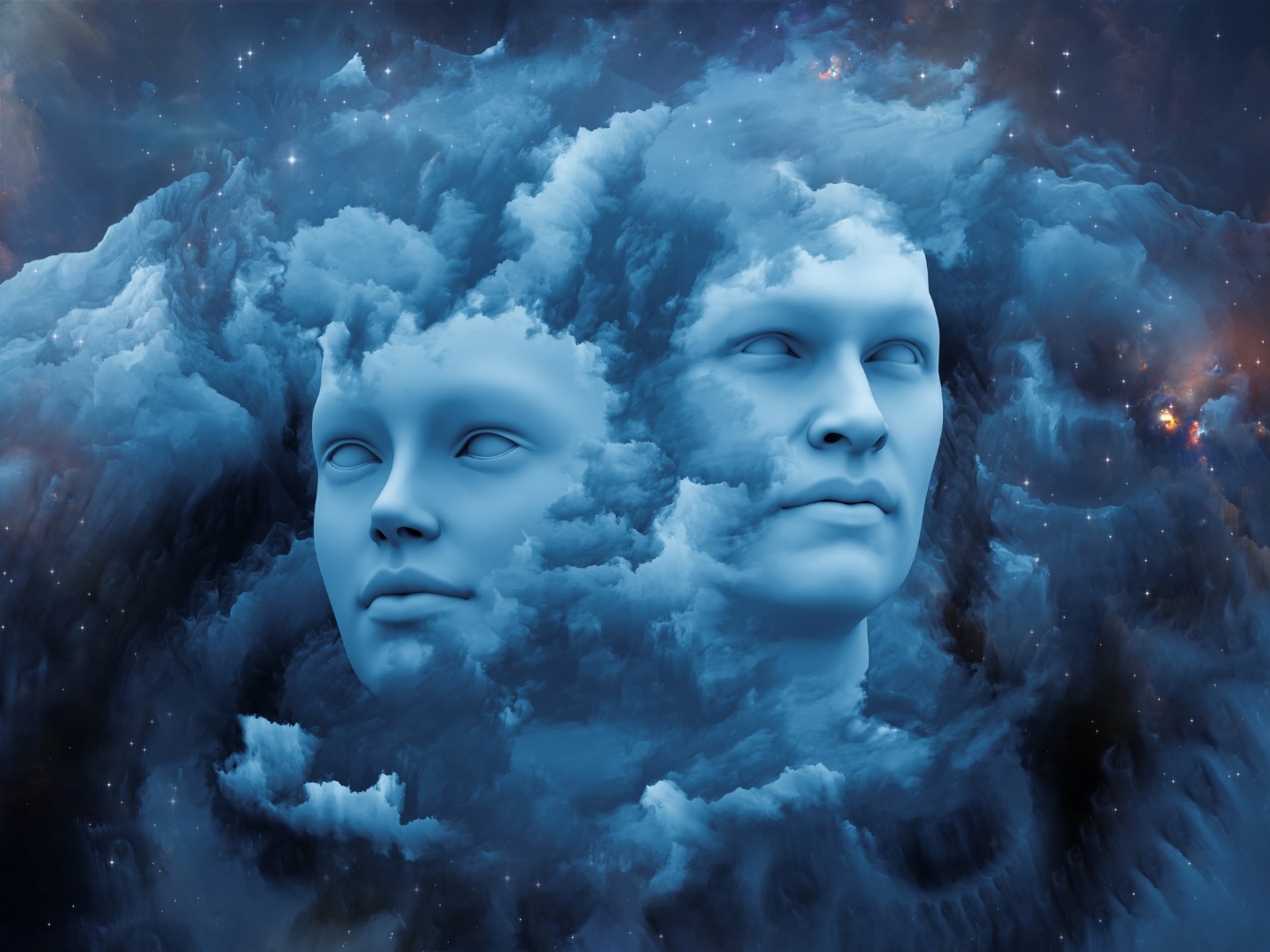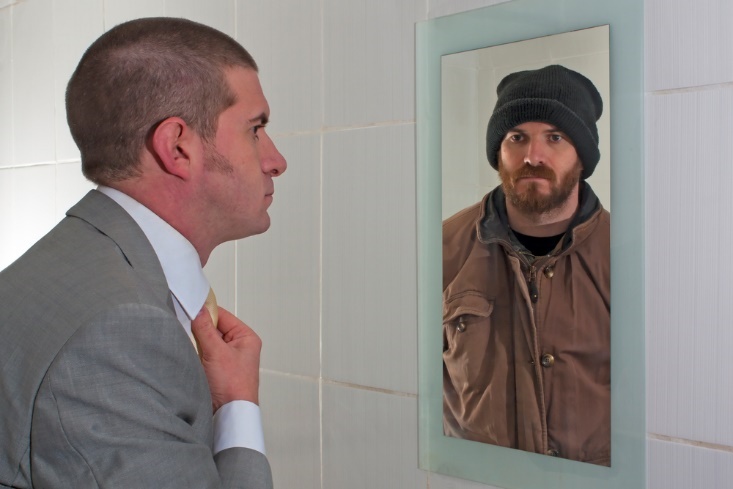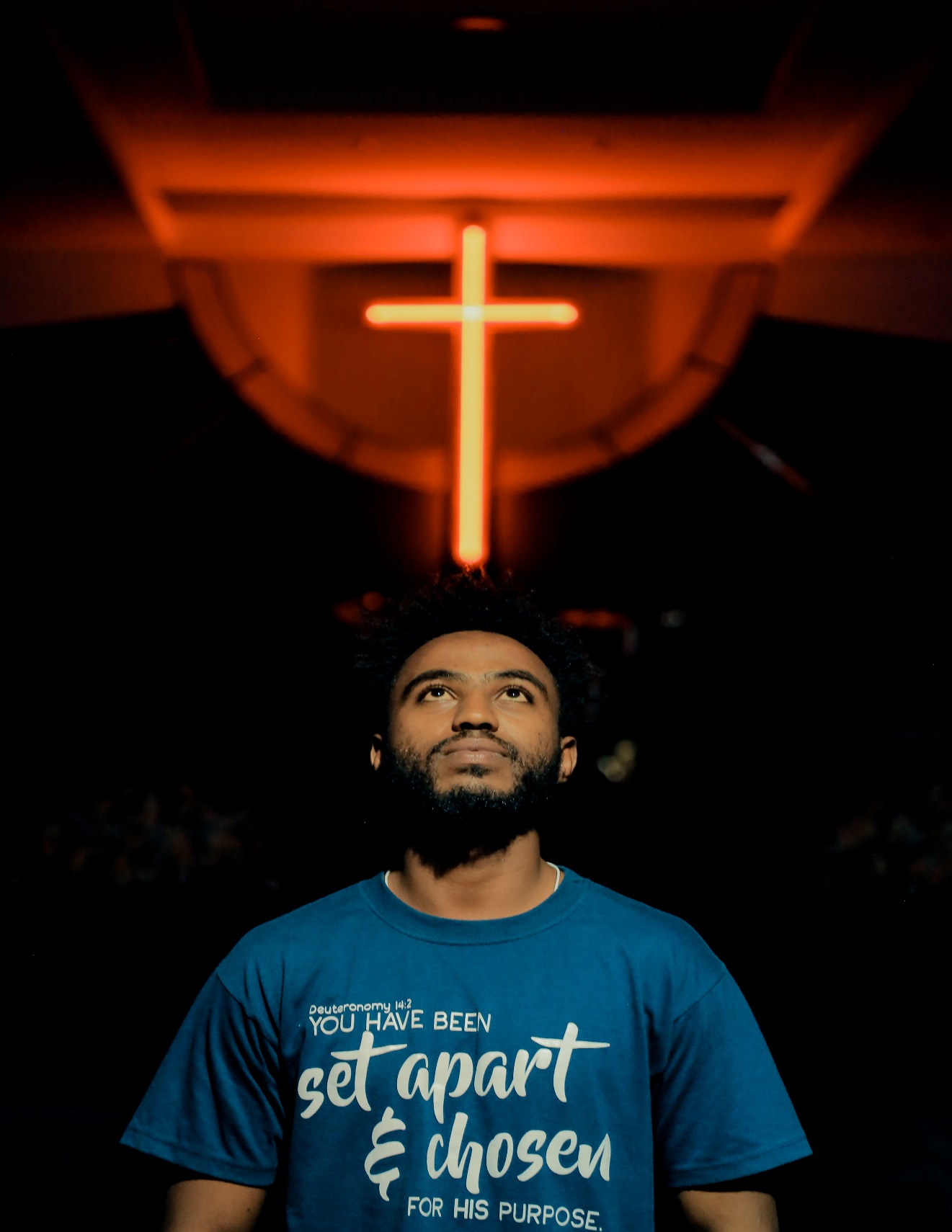BP24
Emily and Samuel were both unhappy with their true self—the person they were on the inside—so they engineered a different identity, a false self. Emily experienced an identity accommodation through the medium of gender while Samuel pursued a different identity through the medium of religion—he tried to become the perfect self who would be good enough for God to love.

Emily divorced her true self including her gender identity because she saw her femininity as weak and shameful after ruining her good girl self (her words) with alcoholism and sleeping around with boys. She lost her sense of belonging with her holy church friends, so she had to find a new place to fit in with her new identity.
Samuel, meanwhile, divorced from his true self including his needs and emotions because he perceived that he had to be perfect and self-sufficient to be pleasing to his parents and to God. If he kept all the rules and did everything well, he would be acceptable. So, he became a performer and an achiever.
Both Emily and Samuel adopted a different self than the one they were designed to be. Both rejected their true self because they perceived that it was inferior, wrong, weak, shameful, unlovable. They scrapped their genuine identity in the junkyard of old, forsaken selves instead of loving and growing the person God had made them to be.
Neither Emily nor Samuel were aware of the great price to be paid when God’s creation is suppressed and exchanged for a manufactured one. Suppression and exchanging never works in God’s world (see Romans 1:18-32). Human identity engineering forsakes trust in the perfect sovereign God and exchanges it for trust in one’s own fallen creative ability to choose.
An ongoing problem for both Emily and Samuel was that while they practiced being the false self year after year, their true identity still existed within them–exiled to the island of misfit humans where it was never seen or loved. What happens to this hidden true self?

The person who goes through life with an accommodated identity, a false self, will be prone to anxiety and depression. The further we move away from who we were designed to be, the greater are the symptoms that cry out that something is wrong. Often, these individuals must find a way to self-medicate so they can mute the pain that comes with this great divorce of self.
We humans, who are we, really? Does God tell us who we are, or do we decide our identity? Is discovering who we are optional in life or is it a top two quest? Is there even a way to discern our true identity?
Let’s consider a few theories from psychology regarding the human self and see if they offer us any insights into human identity.
Freud developed a theoretical construct based on psychosexual development known as the tripartite psyche. Along with other aspects of the self such as the conscious and the unconscious, this model was Freud’s road map to being human.
Freud believed that the human psyche begins with the id and then out of the id flows the ego. He tacks on a third component—the superego–to explain the presence of morality in the human animal.
The id is pure unbridled, irrational desire while the ego is the rational agent that exists to steer the id away from unwanted social consequences if it says yes to every biological urge such as taking someone’s lunch or someone’s spouse or killing the person who is enraging their id to the point of momentary primal hatred.
As was mentioned above, the third component of the tripartite human is the superego. Since Freud was an atheist who believed that the material was all that exists, there is no conscience within humans but only standards internalized from the outside world—parents, teachers, mentors, the culture at large. This collection of standards is what Freud called the superego. It is the critical, moralizing aspect of the human.

The wild, chaotic, lusting id is sometimes portrayed as an untamed horse that runs where it will, as free as the wind and corralled by no one—no authority, no master. Left to itself, the id-horse seeks instant gratification and sees everything—and everyone—as an object to be used to satisfy its demanding biological drives.
A human who practices the habits of the self-seeking id-horse will not last long on this planet as he/she will trigger vengeful thoughts in many people who are targets of its lust.
Here is where the ego comes in. Freud conceived of the ego as a restrainer for the id-horse so the human would be more acceptable to the surrounding society. The ego is the rider who puts a bridle on the wild horse and climbs atop it to steer it where it should go or, better said, where it should not go.
The ego is not a moral agent; its role is not to do good and avoid evil but simply to keep the lusting horse out of too much trouble. The superego is the only source of morality within the human and it seems to be portrayed largely as a negative member of the tripartite psyche in Freud’s eyes. It is a moral anchor that hampers the id-horse as it gallops around the landscape.
What is confusing about Freud’s theory is that he sees the ego as flowing out of the id. Somehow the irrational, chaotic id births the rational organizing ego that foresees negative consequences and delays gratification.
Maybe here we encounter one reason why atheism does not work in our universe. Just like Darwin’s evolution where he theorizes that higher level species flow out of inferior species through natural selection via blind mutations, so Freud posits that the rational comes from the irrational.
Common sense tells us that the superior creates the inferior; that the more intelligent designs the less intelligent; that the less complex flows from the more complex. But if humans theorize that rocks (blindly) produce humans and the chaotic produces the organized then anything can be touted as possible in this world even if it makes no sense at all.
What does seem true is that when God is shunned by a human life or by a whole culture, common sense goes away along with God. At this point, killing babies is legalized and people seem blind to the consequences of such genocide on the psyche of a total culture.
Human life is vacated of its value and a man and a woman are no longer exceptional beings. They are reduced to the level of any other creature on the earth or in the sea.
Alas, I digress. Sorry.
Getting back to Freud and human identity, Freud’s theory of the inside of a human offers some intrigue. He does offer an insight into the selfish drive that every human is capable of exhibiting. His id accounts for the existence of human desire totally apart from love for the other person. There’s no compassion—just animalistic hunger for wealth, power, and sex.

Here we encounter a serious problem with Freud’s pessimistic and deterministic view of human nature—it diminishes the human to a beast. Since the human is not created but accidentally appears at the top of the tree of life, there is no meaningful identity for an individual human.
Identity is reduced to getting what you want with the least amount of consequences. Identity is about seeking pleasure and erasing any authority that might set limits on your desires. There is no God you must obey—good riddance to the bad heavenly killjoy—but there is also no God to tell you who you are and what your purpose is in this world.
Life is ultimately empty of any meaning. Hollow.
In this view of humanity, suicide is not a tragedy but a logical conclusion to bring to nothing the nothingness of existence.
A developmental psychologist named Erik Erikson went beyond Freud’s depressing psychosexual theory to a psychosocial approach to men and women. This switch in emphasis might be attributed to his purported conversion to Christianity after he was married.
Erikson viewed humans in the larger social context and theorized that personality develops as each person resolves existential crises such as trust, autonomy, initiative, industry, identity, intimacy, generativity and integrity.

Focusing primarily on the stages of trust, identity and intimacy, it is clear that Erik Erikson placed emphasis not on fulfilling biological drives/hunger as Freud did, but on a person resolving conflicts that have major impact on relationships with other humans and God.
Certainly, most people would agree that every human must achieve trust, identity and intimacy to live well in this world. In fact, these three experiences seem central to human existence.
Erik Erikson himself, whose Danish birth father faded out of his life like a specter, struggled with his own identity. When he was young, his Jewish mother married a man, Theodor, who would be the only father he would ever know. His mother and stepfather told Erik that Theodor was his real father, a deception Erik later uncovered that led to deep bitterness and distrust .
Not only was Erik confused about his father’s identity, but he struggled to fit in with his peers. He was teased by Jewish children for being a Gentile (he had blue eyes) and teased by his Gentile peers for being Jewish. Is it any wonder that Erikson developed a theory about human development that embraced concepts such as adolescent identity confusion and identity crisis?
So, Freud saw the human basically as an animal seeking to reduce the tension of biological drives by using others. He spoke of developmental stages based on certain psychosexual concepts such as the oral stage and the Oedipus complex along with its complementary Electra complex. Is it possible that his theory centered on sexuality because that issue was prominent in Freud’s personal life?
Erik Erikson envisioned the human as a relational creature faced with tasks such as learning how to trust, how to achieve an identity and how to enter into intimate relationships. Could it be that he was interested in these interpersonal dynamics because these issues were paramount in his own life?
Designer Therapy for Life, while agreeing that the theories of Freud and Erikson both have some compelling explanatory power to understand the human being, argues that human identity ultimately finds definition in the person of Jesus.
If this statement is true, once again we see the practical importance of believing in Jesus Christ as our savior, friend and God; and once again we see that Christianity is not a religion shoulding a person to be good enough for God by obeying the rules (as Samuel attempted to do) but a faith built on loving the One who created us, died for us, and left us with a treasure map for this world.
Erik Erikson, the blue-eyed Jewish boy, was on the right track with his theory that was deeply rooted in social development—in mastering conflicts that could lead to trust, identity and intimacy as opposed to distrust, role confusion and isolation. Life in Jesus is all about mastering these three pillars that bolster healthy relationships.
We could go on to discuss other theories that might help us understand the development of self and identity. Charles Horton Cooley, for example, theorized that all of us develop an identity as we see ourselves in the mirrors of other people as they respond to us with their body language, facial cues, tone of voice and behaviors.

The difficulty that arises if we base our identity on the reactions of others, however, is that the messages we believe others are sending to us often find their origin in our view of ourselves that we project onto them. Thus, a person never knows if she is objectively and accurately reading the messages from the human mirrors around her or if she is subjectively perceiving in the mirrors what she already believes about herself.
Like a person in the hall of mirrors at the circus, a human will often see distorted reflections of himself in others because he has already decided in his own mind who he is (good or bad) and will look for anything that confirms these self-perceptions in those around him.
One last point to consider is that in today’s relativistic culture that has come to defy authority and value individual choice as a birthright, people are increasingly deciding their identity instead of looking to an outside source to tell them who they are. Parents are dismissed and God is erased.
I get to decide what I’m going to do and who I am. I’ll fight for those things even if it kills me.
So many people like Emily and Samuel suppress the truth that Someone made them and has a plan for their lives. Although they have been created by a divine Designer, they defy their innate design and attempt to make themselves somebody they weren’t meant to be. After all, if God has been erased, then each person is free to decide who they are based on instinct and personal choice.

Tragically, so many people cope with internal pain by retrofitting their identity or attempting to do a total makeover. They avoid the difficult journey of growing their true self and instead construct a false self that will totally suppress their true identity.
How much heartache could be avoided if people would see themselves in God’s mirror!
What do you see when you view yourself in the divine mirror? You see that: 1) an all-wise and all-knowing God who never makes a mistake created you “fearfully and wonderfully”—Psalm 139; 2) He created you in His image with a conscience and consciousness, the potential to love deeply, a desire to worship your Creator, and self-awareness; 3) He chose you before the foundation of the world and saw you in your mother’s womb; 4) He pursued you to adopt you into His forever family; 5) He died for you so that He might ransom you from sin and the fear of death; 6) in His book are written all the days that were formed for you—yes, He has a plan for your life that will bring you hope and an amazing future; 7) one day you will appear with Him in glory and live in His Presence eternally. But until the day arrives when Jesus calls you home, you’re invincible, so go out and live your life and don’t fear death.
Freud describes the human apart from God—selfish, rebellious and controlled by the biological drives like the beasts of the jungle.
Erikson thoughtfully develops the conflicts each person must master in this world so they can grow into a mature relational being.
But God in Jesus brings the best and clearest news about human identity and the true self. So, join His family and begin walking by faith, not by sight.
You won’t go to the Never Never Land or down some rabbit hole into a fictional Wonderland, but know this: when you give your heart and will to Jesus, He creates a new self within you who will one day go to a distant land that needs no sun, moon or stars for light. All the illumination that is needed comes from the God who made you for a divine purpose in this world and the next.
This God says to you, “The Lord your God is in your midst, a mighty one who will save; he will rejoice over you with gladness; he will quiet you by his love; he will exult over you with loud singing” (Zephaniah 3:17).
He also says to you in Ephesians 2 that “you are no longer strangers and aliens, but you are fellow citizens with the saints and members of the household of God.” This chapter also refers to you as God’s workmanship (literally, poem in the original language) created in Christ Jesus.

So, find your true self, your created identity, by seeking Him first. In Him, the perfect mirror, you will come to know and see the beautiful poem you were written to be. A poem in this fallen world may not always rhyme, but it will always reflect the love of its author and the beauty of His chosen one.
If there’s anything more exhausting than running from your enemies, it must be running from your true identity in God. If there’s anything more dangerous than waiting on God, it must be refusing to wait and taking your future into your own hands ~ Laura Story
